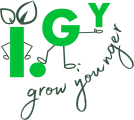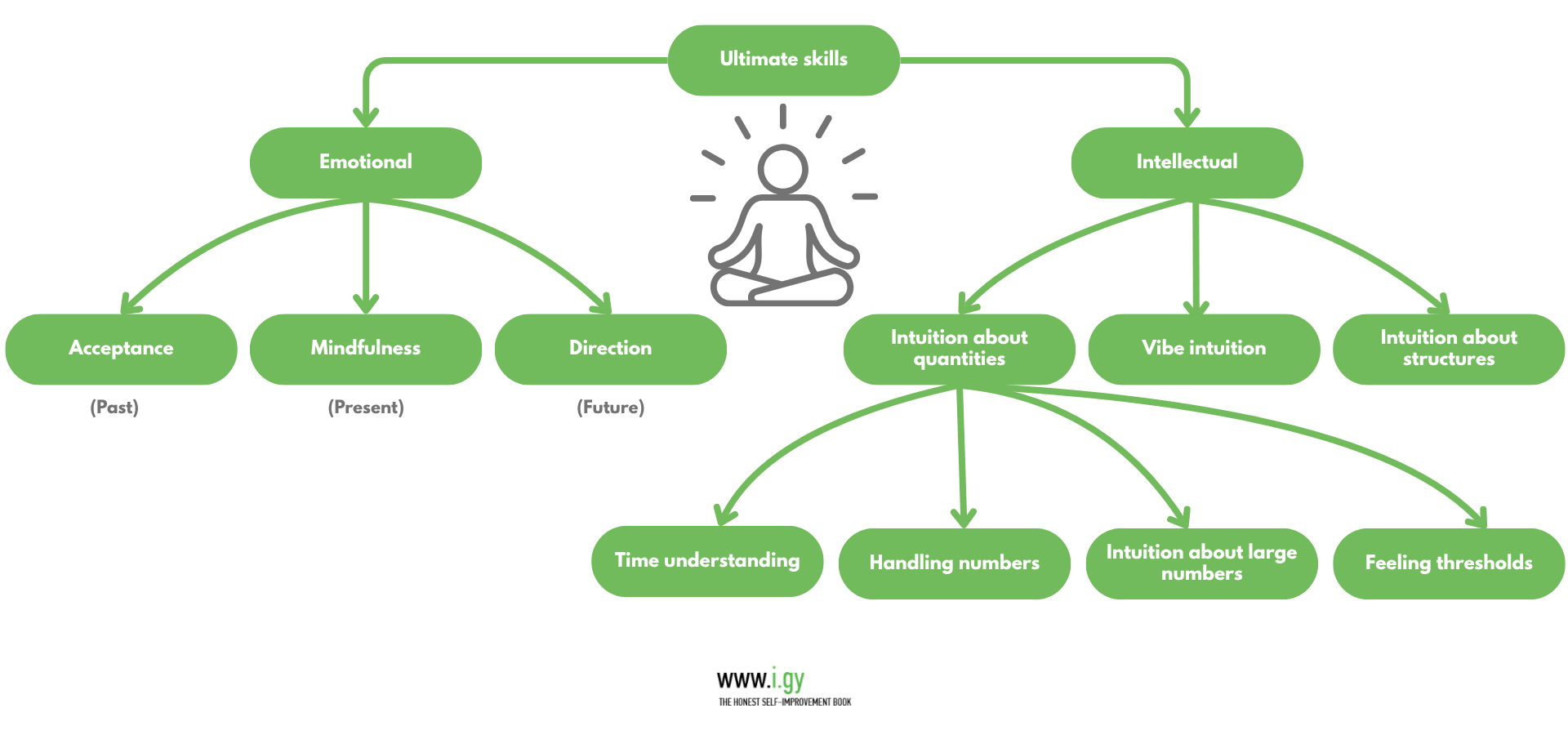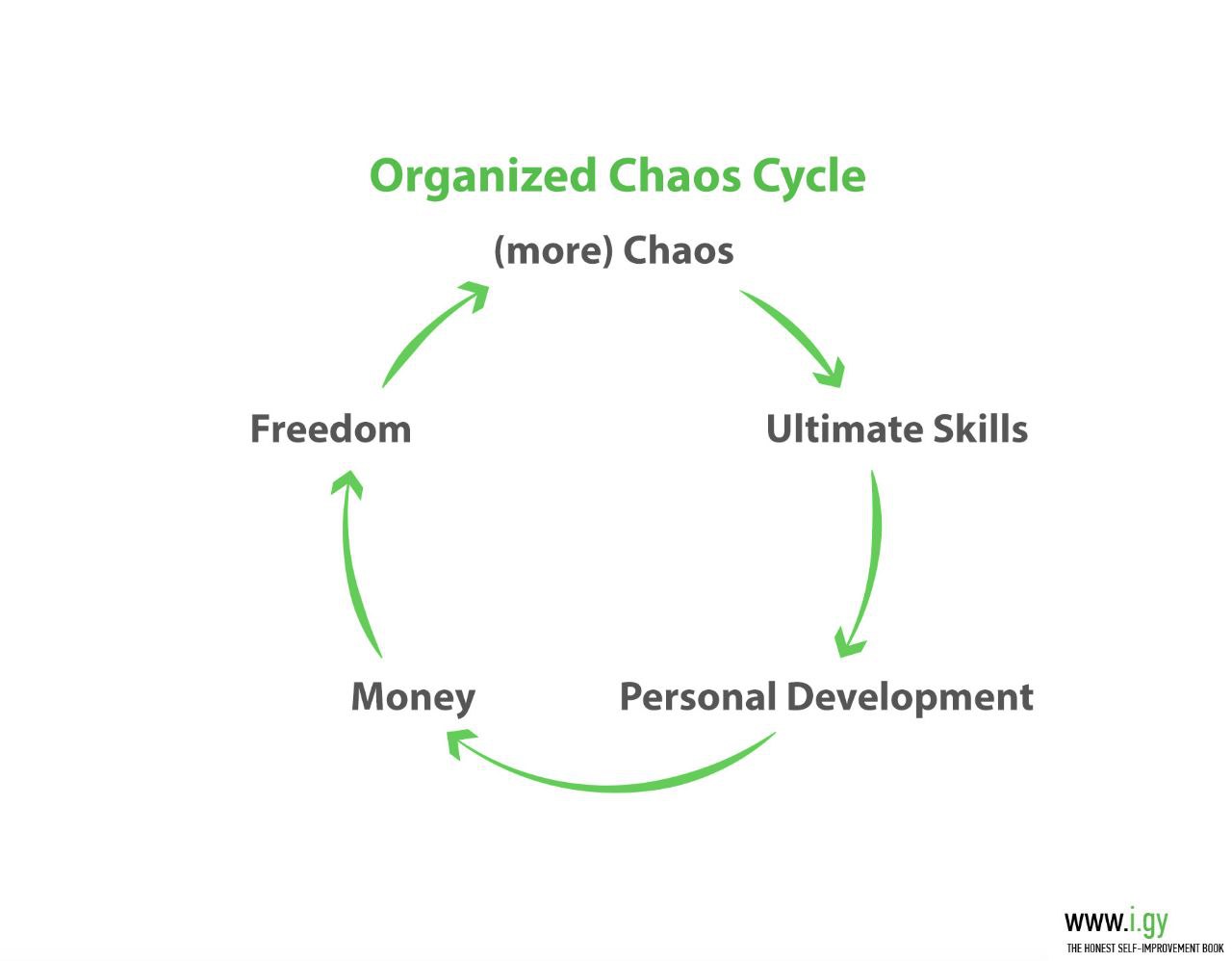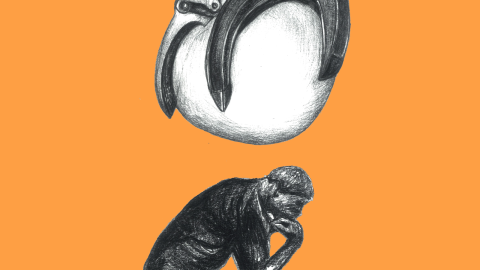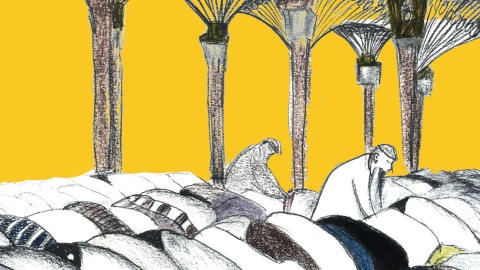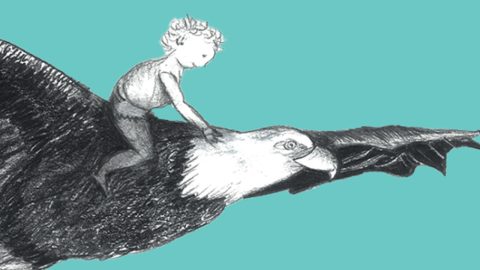Invention, it must be humbly admitted, does not consist in creating out of void, but out of chaos – Mary Shelley
(This article is written from the standpoint of a single person. In this context, chaos means unpredictability in your personal life, not world anarchy.)

In life, you have billions of potential axes of improvement.
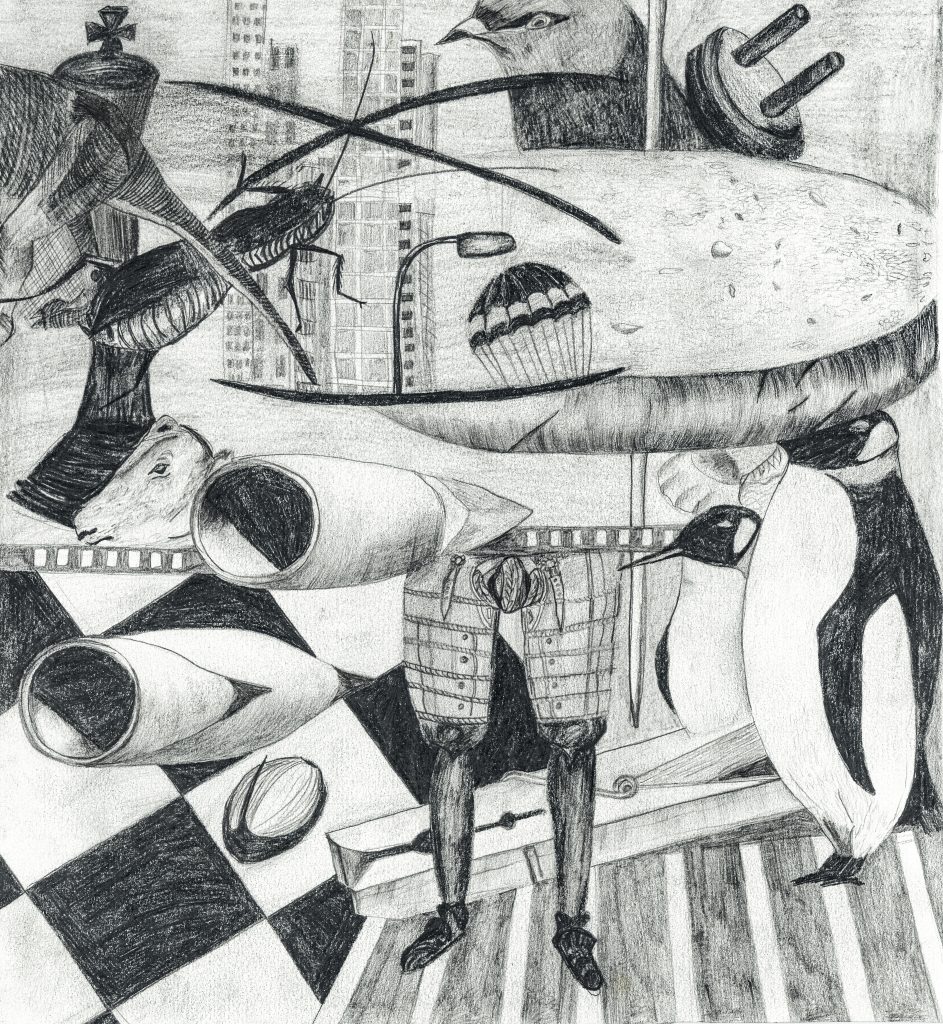
You can improve your communication skills, learn to code, or learn French. How can you know which of these will help you in the future, keeping in mind your vision for the future may also change with time? How do you solve the billions of ROI equations so you know your time and efforts are well invested?
The truth is, you can’t. The unknowns are too many. So, how do you decide in what direction to grow?

For many people, this is a very confusing part of their lives. They want to do something, but they are just lost between all the options. We didn’t evolve for such a huge choice, and it’s often paralyzing.
We talked about choices when discussing the importance of freedom. But we didn’t mention something important there… where the fuck do we even start?
Here is what we can choose to improve:
A. Skills
If you learn to speak French, this skill is mostly good for… speaking French. Of course, the brain may get some external benefits, but they are likely to be concentrated in the brain’s left hemisphere, the one responsible for language. Because of culture and the educational system, our right (intuitive, creative) hemisphere is the one more worth developing, so the broad benefits from French will be marginal.1 The economic benefits are totally not worth the effort – too many people speak French already. So the ROI on learning French is very poor, and you should only do so if you really enjoy it.
Most skills are similarly narrow, and given the huge choice, you should develop a skill only if it’s really economically beneficial due to high demand, like coding or SEO, or if it’s really fun, like playing the guitar.

B. Meta-Skills
Every skill that can be applied across different fields is a meta-skill. If you’re good at communication or sales, you can use this in a ton of different jobs or as an entrepreneur.
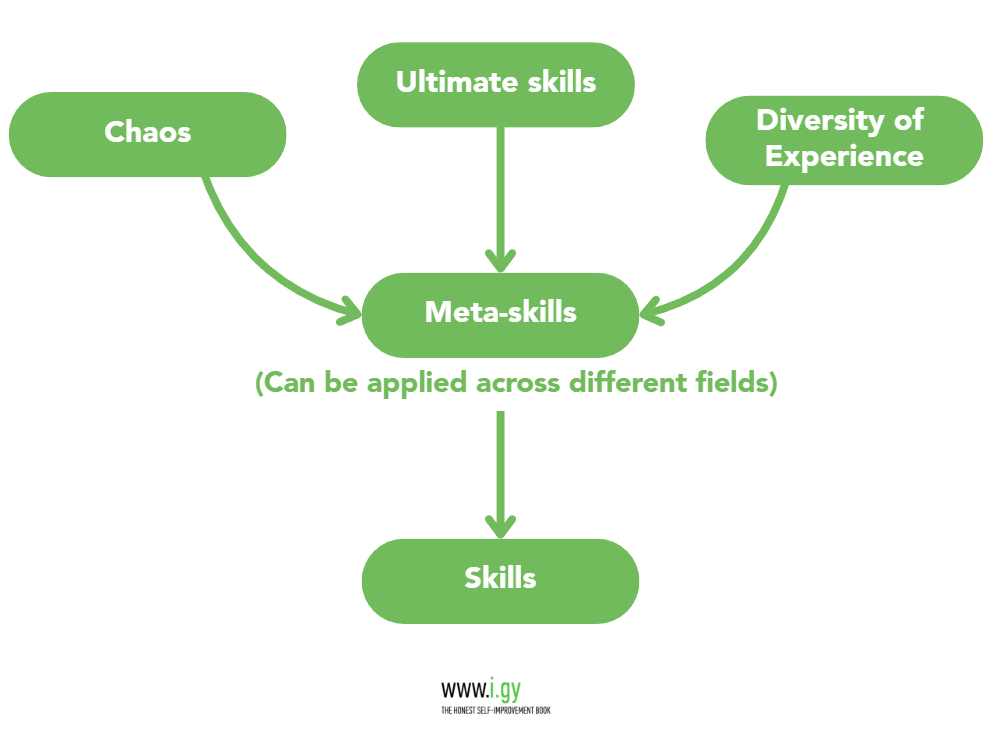 Meta-skills are, of course, much more important. But how do we develop them? They are much more about experience and building intuition, and there is no written recipe for this.2 Except the one few people would like to admit…
Meta-skills are, of course, much more important. But how do we develop them? They are much more about experience and building intuition, and there is no written recipe for this.2 Except the one few people would like to admit…
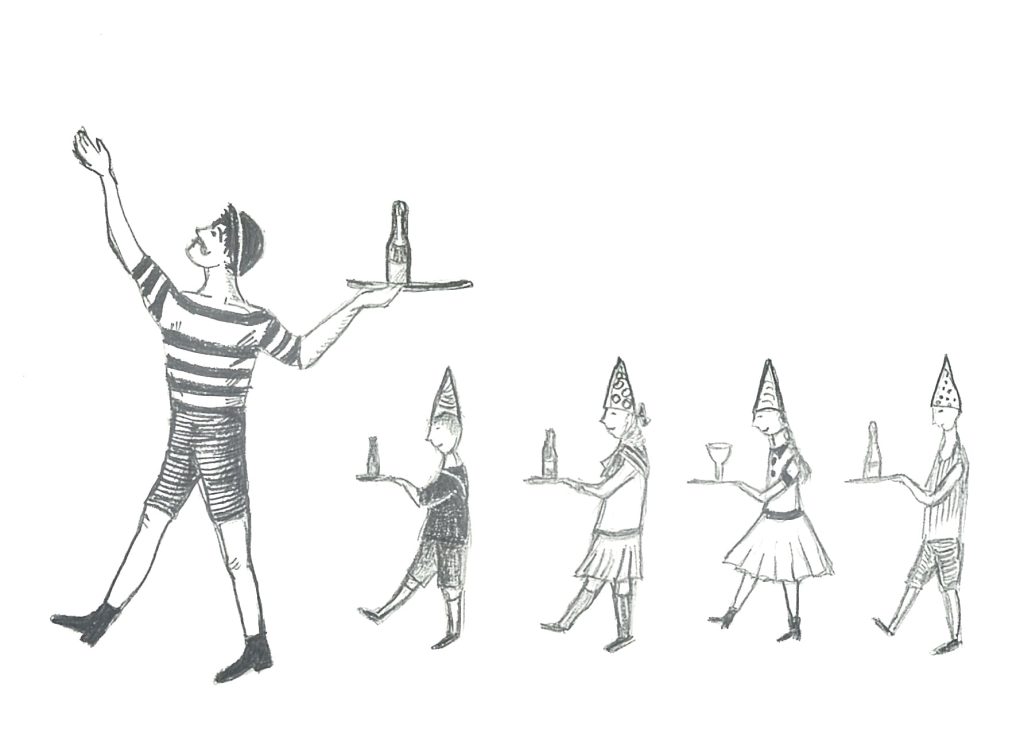
Chaos is the path to Meta-skills!

It may seem puzzling how chaos in our life can help us learn anything better than say an MBA (master bullshit artist) organized education program by great professors. To understand why, we have to dive one level deeper. But first, a general overview of the two types of learning is possible.
If you have to learn something in a day (like in school), you just have to do it the usual boring way – read or listen, or watch the most systematised version of the content.

With points and subpoints, etc., structure, not chaos. The problem is that most of the brain never had to do much dot-connecting in the process, so the knowledge is only short-term.3 How much do you remember from the raw information you were taught in school? Is it even 5%? Clearly not an approach good enough.
There is a bigger problem, though. When you do structured learning, it lacks nuance and possible relations. The information is not easily connected to the other stuff you know.
Committed, engaging teachers may help out, but only partially. Because even the best storytelling is still not equivalent to you connecting the dots yourself.
Then why do we do structured learning in school? Because of our unhealthy obsession with order, and because we aim way too low in education. Chaotic learning cannot be evaluated with a test in a week or a month, it takes time. But the results are much better and last for decades.
Cramming for a test and not remembering anything after that in a year is beyond stupid. With chaotic learning, you may have nothing to show in a year.

But in 3 years, you’ll have a better intuitive understanding of the field, not just compared to the structured learners. You’ll be better than most teachers. And deep, intuitive understanding is the ultimate brain skill. It means you can solve any problem in the field, not just ones similar to the ones you already have. Why do we aim so much lower in education, that is beyond me?
Each meta-skill is like building a bridge between your personality and the skill itself.

If you want to be a good salesperson, you need conviction, which is a personal trait.4
If you want to be a good communicator, you need authenticity, which is a personal trait.
If you want to develop critical thinking, you need to love truth, which is a personal trait.5
And so on…
So, how do we improve our personality so we can improve all meta-skills at once? This is a whole new level:
C. Ultimate Skills
There are 3 emotional and 2 intellectual skills that you use in almost every moment of your life. We’ll call them ultimate skills.
Of course, there are other similar core skills you constantly use, like your senses and spatial awareness, but those are biological – you have them already, and they just seamlessly work. Emotional and intellectual skills can and should be developed6 much more, so we’re focusing on them.
Think about what you do in every single moment of your life. You feel and you think.
Feelings and emotions are a product of your past (this includes everything that formed the current you, your identity) + what life does to you (incoming flows – good, bad, and mixed) + everything you do. So you need the three respective Ultimate skills:
- Handle the past better (Acceptance); You cannot change all of the past, most of the present, and part of the future. You will be able to change most of the future if you accept all of the past, plus the present, you cannot change. Denial of reality has never helped anyone. You also need to accept yourself as who you are (the result of your genes, past choices, and environment), also known as self-love.
 Handle the incoming flows better (Mindfulness); Every time something happens, you can react and/or observe. While reacting emotionally is the natural path, observing is powerful as it lets you learn more about yourself, other people, and the world. Even while reacting, you can still observe and try to understand yourself and the world. Emotions are your fue
Handle the incoming flows better (Mindfulness); Every time something happens, you can react and/or observe. While reacting emotionally is the natural path, observing is powerful as it lets you learn more about yourself, other people, and the world. Even while reacting, you can still observe and try to understand yourself and the world. Emotions are your fue
l in life, but don’t pour them over fires.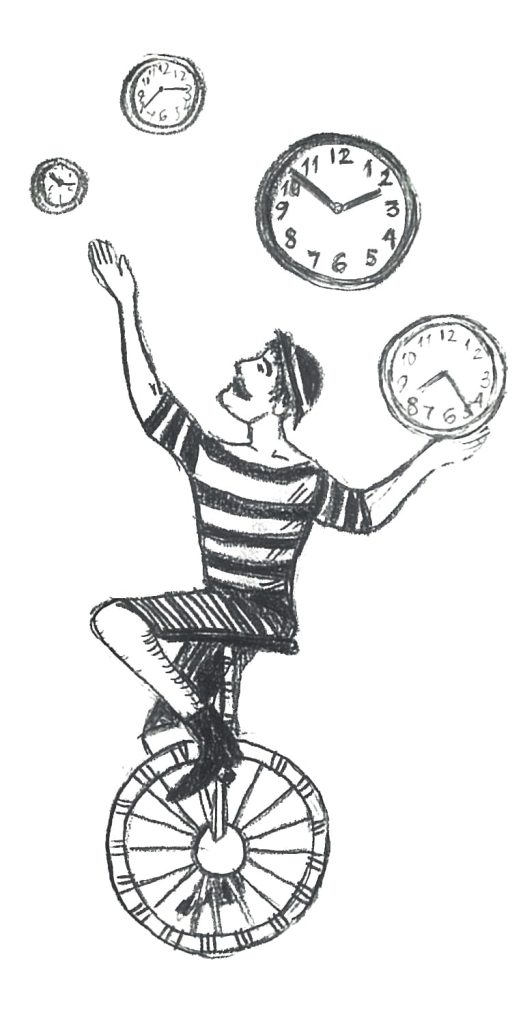
- Make your actions better (Direction); Every action of yours can be in an outward direction (driven by love and energy, we call it a “hunter” act) or an inward reaction (driven by fear and inertia, we call it a “sheep” act).
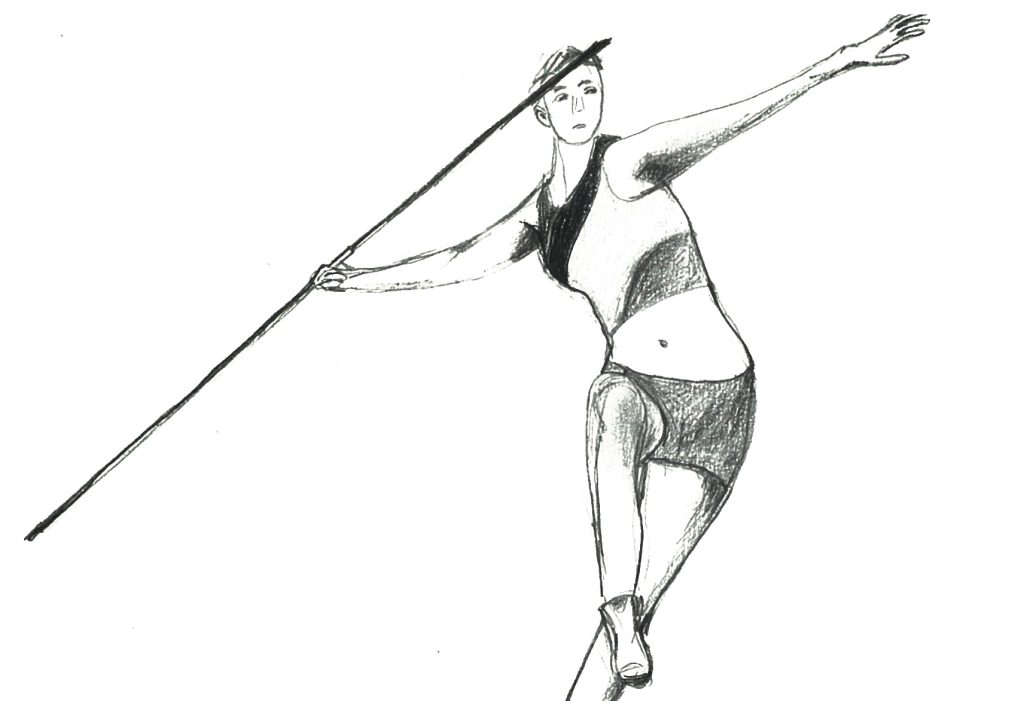
So, accept the past and the present moment, be mindful, but also be a hunter. At any given time. This is the basis of your emotional intelligence.7
What about thinking, do we think all the time? In a way, yes, if you count the less visible intuitive processes.
Logical (box-dominated, left brain) thinking is way overrated, practiced in the wrong (flow-dominated) areas by many overthinking people, and you won’t hear me say it’s that useful for the average person beyond obvious examples like everyday math.8
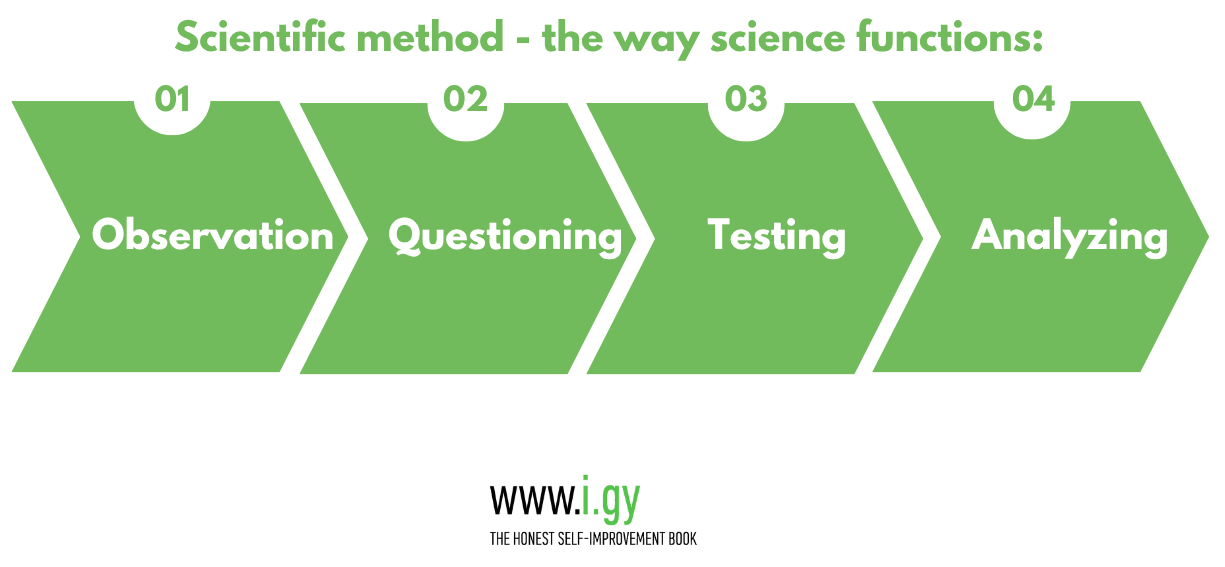 It’s very useful for humanity since it can be added up using the structure of The Scientific Method that skeptically extracts all the value from the mix of right and wrong ideas. So if you’re a scientist or engineer, by all means, develop your logical thinking for the benefit of humanity. For the rest of us, we already have way too many boxes in our brains.
It’s very useful for humanity since it can be added up using the structure of The Scientific Method that skeptically extracts all the value from the mix of right and wrong ideas. So if you’re a scientist or engineer, by all means, develop your logical thinking for the benefit of humanity. For the rest of us, we already have way too many boxes in our brains.
In reality, on a personal level, two types of intuition determine how much we develop our huge intellectual potential – the power to understand/assess and then to potentially discover and create.
- Intuition about structures – relations between objects, causes and effects, and how everything evolves over time.
 This includes the most complicated structures – other people and the ways they feel, think, and interact.
This includes the most complicated structures – other people and the ways they feel, think, and interact.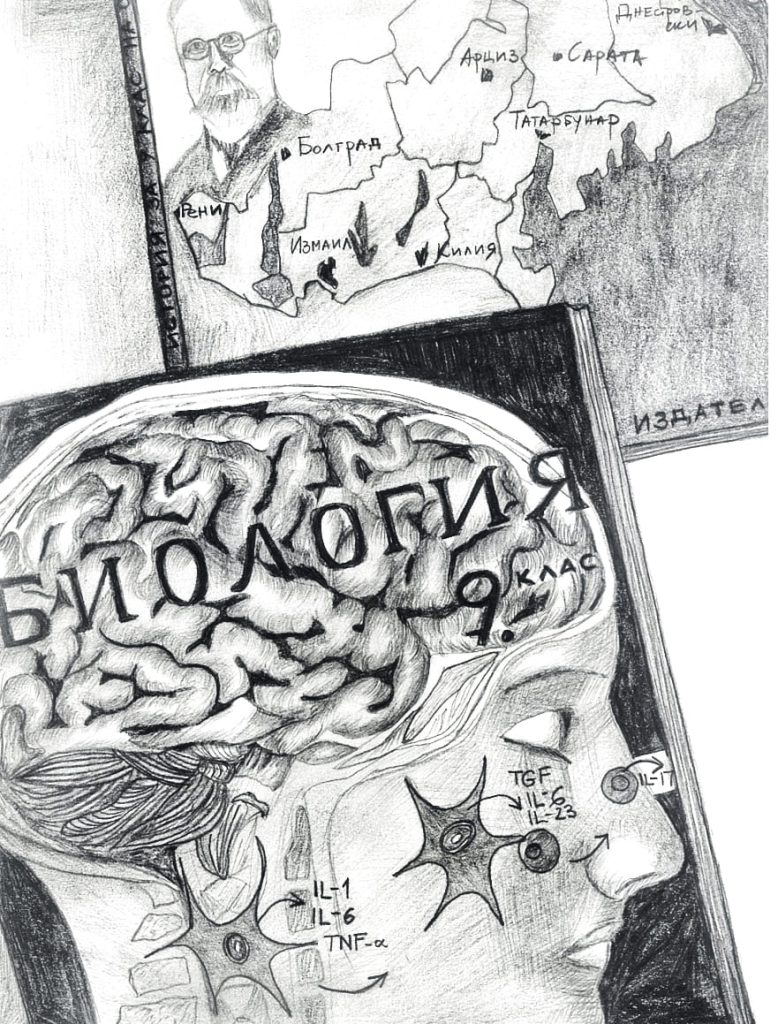
- Intuition about quantities and thresholds – how much is there of everything quantifiable in… everything. Space. Time. Value. Money. People’s tolerance for your shit. Your tolerance for their shit. Their tolerance for their… you get it. All odds. All limits you don’t want to exceed. All critical masses are needed to trigger change.

These two require a very different wiring of the brain. Most people have one of them very underdeveloped and rely on what they have of the other, plus filling the skill gaps with attempts at logical thinking. But without a real intuitive understanding and logical thinking will only get you somewhere in here.
It’s a big challenge to develop them both, but it’s not impossible – after all brain is big. And you only have to do it once!
If you can practice Acceptance9 and Mindfulness10 while Directing your actions as a hunter, you’ll never have emotional barriers holding you back.11
If you develop an Intuition about structures and an Intuition about quantities, you’ll never have intellectual barriers holding you back.
Chance is a big factor in life.
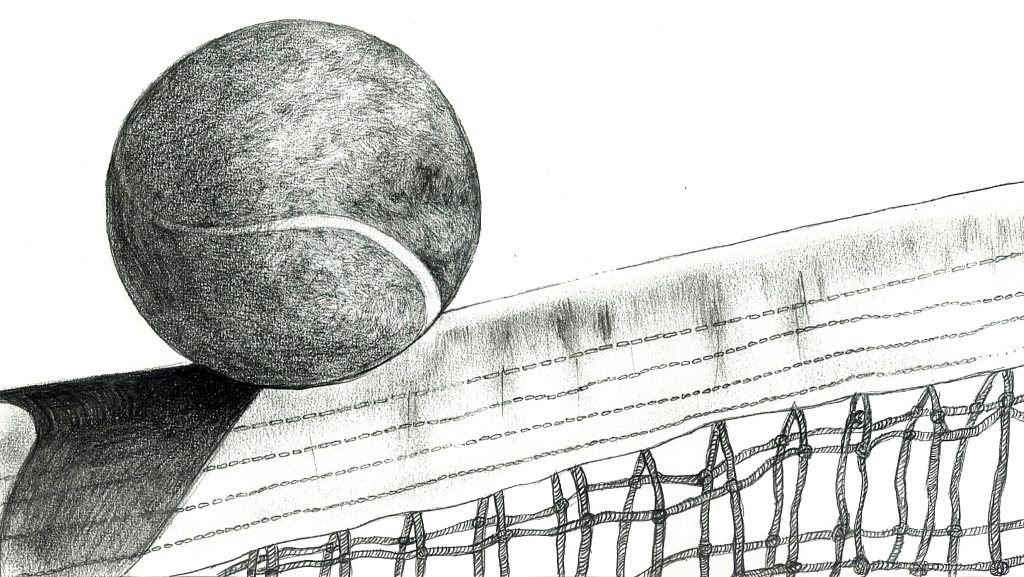
Even with the above five Ultimate skills, you may still encounter occasional fails, even big ones. But your overall progress when measured by the best life metric – Long-term freedom – will be off the charts. Because you won’t be learning something new every day. You’ll be learning something new every minute.
So now we know what you need above all is Ultimate skills (constant personality and intuition improvement), resulting also in Meta-skills. How do we train our Acceptance, Mindfulness, Hunter mode, and the two types of Intuition? What forces do we have available to push us in those directions?
The two competing forces in your life are not good and evil – these are not actual forces of nature but rather made-up human concepts that don’t really govern much. The actual forces whose dance creates the future are chaos and structure.
Let’s see what they can help with for each Ultimate skill:
Acceptance is very closely related to self-love. It’s a flow, and structure is useless for those. When talking about self-love and self-worth, we already mentioned that chaos is the answer in the form of illogical decisions that break the “get-only-what-you-deserve” pattern we were brought up with.12
Chaos 1-0 Structure.
Mindfulness is the art of not reacting, labeling, or even thinking. It’s a flow state, as detached from structure as you can possibly be. This is why it’s so healthy. It’s basically being fine with your internal and external chaos.
Chaos 2-0 Structure.
Hunter mode is about taking bold actions and facing fears if needed. Since doing nothing (the reverse state, Sheep mode) is way more structured than being brave, curious, and creative, Chaos is related to Hunter mode. Still, the Hunter’s time is often spent on solving specific problems, which, although coming from the power of a flow, often have a certain box-fixing-left-brain organized chaos feel to it. As this is more an effect than a cause, I’m being a bit generous to structure here, but I’m calling it a draw – both chaos and structure play a role in staying in Hunter mode.
Chaos 2,5-0.5 Structure.
Intuition about structures is about feeling how structures form, evolve, and interact. Alexander Grothendieck (often quoted by us) probably had the best intuition of this type in the history of mankind. Unfortunately, he didn’t have the other Ultimate skills, so he couldn’t revolutionize the world, even though he was politically passionate and very much wanted to. He had to be content with only revolutionizing many fields in mathematics.
Paradoxically, for the average non-genius-and-certainly-not-Grothendieck person, because of the two types of learning discussed above, you need chaos to learn to feel structures. Chaos will help you encounter many random structures in a given time, and this is all your brain needs to start connecting dots like a maniac. Still, don’t overdo it as this is essentially pushing your brain to its intellectual limits. We all know there is a thin line between being a genius and insanity. The good news is most of us are very far from this line and should not be too worried about crossing it.
Chaos 3,5-0.5 Structure.
Intuition about quantities like time and money – this is what Warren Buffett and the other best traders and investors have. This is a must-have quality if you’re running any type of business. Since it’s all about flows, structures are helpless – if they weren’t, only bots would be trading long-term stocks since a supercomputer bot can have the most complicated structures in tens of millions of lines of code and unlimited data access, and it can calculate millions of scenarios in a minute. And still, still Warren Buffett is better at this. Because he has the intuition about the flows. And how did he build it? By starting to invest at the age of 11. He’s now 93. I can assure you that he has seen a lot of chaos to build this gut feeling.
Chaos 4,5-0.5 Structure.
You should not be surprised that Chaos won in a landslide.
Structure can only preserve, Chaos is the Force of Creation
In developed countries, we live in a relatively safe and stable world where preservation is outsourced to the government, police, military, scientists, engineers, doctors, first responders, etc.
The rest of us are more rewarded for creating. The current economy rewards new ideas and dynamic action. It rewards chaos as long as it doesn’t clash with the rule of law. Entrepreneurship needs chaos, and it’s currently the best path to money and long-term freedom.
Chaos participates in the hunter/sheep dynamics as mentioned, but is also a main actor in financial dynamics. There are two cycles you can be in:
Virtuous organized chaos cycle:

- Chaos develops the Ultimate skills of a person and brings them personal growth and money.
- Money brings freedom because of its ability to fix small problems easily, sparing also your time.
- Freedom can bring more good chaos if you happen to need it and don’t have any.
Vicious no-chaos cycle:

- No chaos means less Ultimate skill growth and therefore poor Meta skills and less money.
- Less money means less freedom and more time dealing with small problems, limiting your flow.
- Less freedom restricts your options to create good chaos as you live by external structures (eg, a lousy 9 to 5 job just to make ends meet).
I have to make an important note on the economic benefits of Chaos. You need to understand very well the structure of money and business, and be ready for some small failures before everything clicks. You won’t become wealthy overnight.
This is a 3 to 5-year plan for the average person since your mindset doesn’t just flip overnight. It’s challenging and rewarding, but don’t load yourself with expectations or you’ll ruin it all. This is strictly a no-expectations strategy. To help yourself get into the right mentality, we have more articles about what you need to understand to make chaos work for you financially.
On the other hand, “organized chaos” is simply good for mental health as it guarantees that you go out of your comfort zone and face your fears on a regular basis.13 So even outside of the entrepreneurship/financial freedom plan, it’s still worth introducing in your life.
The Ultimate skills don’t just help you succeed. They also make you happier and a better person to be around.
In summary, structure is very valuable for mankind. We owe much of the progress in our quality of life to its preserving qualities.
Your personal life structure definitely has its place in the form of good habits.
It would be weird and emotionally exhausting to eat random food, meet random people, and go to random places all the time. Humans need a supporting framework of consistency in their lives.
However, we have gone too far in developed countries, and most people are now way too… structured. If many of your days are close to being the same, you potentially have a problem psychologically and financially. We need chaos to grow, and we need it to earn money while keeping a good amount of freedom in the current economy.
Chaos is a great agent of growth, and its introduction into your life can be organized. We want a bit more than you think you can handle, but… not ten times more, or you can panic and bail out. You know yourself, you’ll figure it out, just keep in mind that whatever you think you’re capable of…
…It’s always more.
Where do you find chaos that is both good for you and can be organized, semi-controlled?
I have experience in this, but if I tell you, it will no longer be chaos. It will be advice. So I won’t. Many of our other articles have clues about this, though. Not about what you should do – this is up to your imagination, just play around. But it’s very important to know what not to do and what not to believe in. To let go of the myths we were brought up with, along with our barriers. To Grow Younger.
For a start, in order to have a chance, you need to know how to fight the archnemesis of good chaos – the boxes.
- Spagna, A., et al. Right hemisphere superiority for executive control of attention.//Cortex, 2018.
https://www.researchgate.net/publication/329986890 - Senova, M. Meta-skills are the key to human potential.//Journal of behavioural economics and social systems, 2020.
https://www.researchgate.net/publication/362056968 - Forsberg, A. et al. Working memory limits severely constrain long-term retention.//Psychonomic Bulletin & Review, Dec 2020.
https://www.researchgate.net/publication/346608038 - Prasad, S., Prasad,S. Conviction and online purchase intention towards apparel in online environment.// International Journal of Retail & Distribution Management, Mar 2023.
https://www.researchgate.net/publication/369259592 - Acevedo, E., Hess, C. The link between critical thinking and personality: individual differences in a concern for truth.// Modern psychological studies, Feb 2022.
https://www.researchgate.net/publication/361703748 - Gilliani, G., Rahardjo, M., The influence of intellectual intelligence and emotional intelligence on employee performance mediated by job satisfaction, August 2023
https://www.researchgate.net/publication/375193199 - Anand, N. et al. Emotional intelligence: An important skill to learn now than ever.//F1000Research, Sep 2023.
https://www.researchgate.net/publication/373915890 - William, C. et al. Thinking theta and alpha: Mechanisms of intuitive and analytical reasoning.// NeuroImage, 2019.
https://www.researchgate.net/publication/330596883 - Pramanik, S., Khuntia,R. Decoding Unconditional Self-Acceptance: A Qualitative Report.// Journal of Rational-Emotive & Cognitive-Behavior Therapy, Jul 2023.
https://www.researchgate.net/publication/372393283 - Himes, L. et al. The Relationship between Trait Mindfulness and Emotional Reactivity Following Mood Manipulation.// Mindfulness, Oct 2020.
https://www.researchgate.net/publication/345941768 - Carson, S., langer, E. Mindfulness and self-acceptance.//Journal of Rational-Emotive & Cognitive-Behavior Therapy, Jun 2006.
https://www.researchgate.net/publication/226501882 - Henschke, E., Sedlmeier. What Is Self-Love? Redefinition of a Controversial Construct.//The Humanistic Psychologist, 2021.
https://www.researchgate.net/publication/355152846 - Russo-Netzer, P., Cohen, G. If You’re Uncomfortable, Go Outside Your Comfort Zone”: A Novel Behavioral Stretch Intervention Improves Life Satisfaction Among Unhappy People.// The Journal of Positive Psychology, Jan 2022.
https://www.researchgate.net/publication/357394040
Organized Chaos Helps You Develop Ultimate Skills
Structure helps you cope every day,
but chaos lets you go your way!
The one is made for basic things,
the other gives you force and wings.
And builds the five ultimate skills,
that take you on top of all hills!
Acceptance masters your own past –
it keeps your mind free, smart and fast.
Be mindful – don’t think and react!
Thus you catch the flow and show tact.
Take the outward direction –
that is love and hunter action!
Structure needs the intuition –
both together form cognition!
Intuition in quantities
sets your business priorities.
Use these skills every single day
and you will always find a way!
